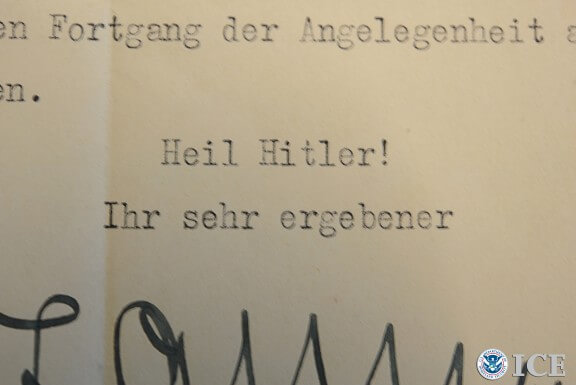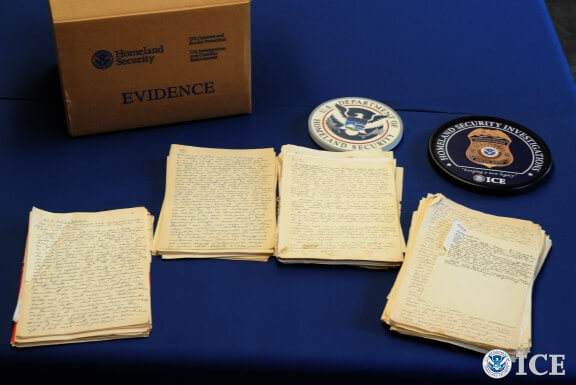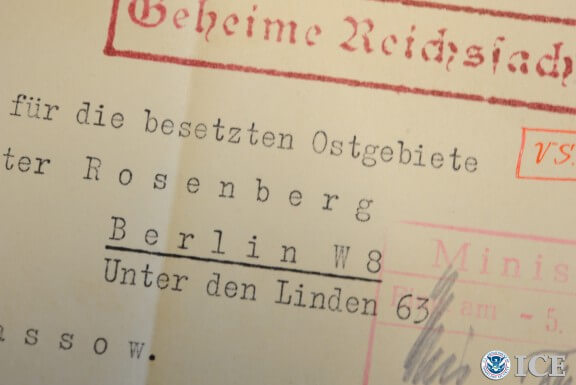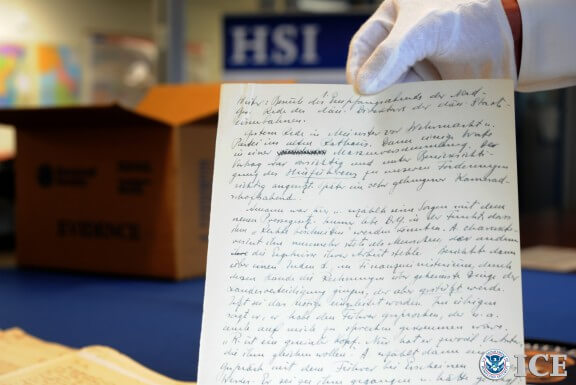Federal officials and representatives of the U.S. Holocaust Memorial Museum in Washington, D.C., announced last week the seizure of the Rosenberg Diary, a long-lost journal kept during World War II by notorious Nazi party official and Adolph Hitler confidant Alfred Rosenberg.
The U.S. Attorney’s Office for the District of Delaware and agents with U.S. Customs and Immigration Enforcement’s Homeland Security Special Investigations Unit last November received a tip from an art security specialist regarding the historic document’s whereabouts.
The Rosenberg Diary was seized after officials obtained a warrant from the U.S. District Court for the District of Delaware.
“Thanks to the tireless investigative work of HSI special agents and years of perseverance by both the U.S. Attorney’s Office for the District of Delaware and the U.S. Holocaust Memorial Museum, the long-lost Rosenberg Diary has been recovered, not in Germany but in the United States,” ICE Director John Morton said in a statement.
“This important record of the crimes of the Third Reich and the Holocaust is now preserved for all to see, study and learn from. The work of combating the international theft of cultural heritage is a key part of our work, and no matter how long these items may appear to be lost to history, that hard but important work will continue.”
Alfred Rosenberg served during World War II as head of the Nazi party’s foreign affairs department and as the Reich Minister for the Occupied Eastern Territories, playing a significant role in the mass murder of the Jewish people and in the deportation of civilians to forced labor camps in Eastern Europe.
Rosenberg also established the Reichsleiter Rosenberg Task Force to loot cultural property from Europe, according to officials.
Investigators believe Rosenberg’s diary entries could provide historians with “a potential wealth of previously unknown information” because the Third Reich official was privy to much of the planning and conduct of World War II and the occupation of Soviet territory.
“The discovery and return of this long-lost, important historical document to the government of the United States is a significant achievement,” U.S. Attorney Charles Oberly III said.
“Although it is a reminder of a dark time, the Rosenberg Diary is important to our understanding of history. Our hope is that it will provide valuable insight to historians.”
The Rosenberg Diary was seized by Allied Forces following Germany’s surrender in May 1945 and kept in the Records Subsection of the U.S. Army War Crimes Branch’s Documents Unit to serve as potential evidence of war crimes.
Rosenberg was during the Nuremberg Trials found guilty of conspiracy to commit aggressive warfare, crimes against peace, war crimes and crimes against humanity andwas hanged on Oct. 16, 1946.
But authorities say following the trial, chief prosecutor Robert Kempner removed various documents – including the Rosenberg Diary – from U.S. government facilities in Nuremberg and kept them at his Landsowne, Pa. home until his death in 1993.
Now that the government has retrieved the Rosenberg Diary, it will be studied by officials at the U.S. Holocaust Memorial Museum.
“The United States Holocaust Memorial Museum is thrilled to have recovered the diary of Alfred Rosenberg, a leading Nazi ideologue,” U.S. Holocaust Memorial Museum Director Sara Bloomfield said.
“As we build the collection of record on the Holocaust, having material that documents the actions of both perpetrators and victims is crucial to helping scholars understand how and why the Holocaust happened. The story of this diary demonstrates how much material remains to be collected and why rescuing this evidence is such an important museum priority.”


































